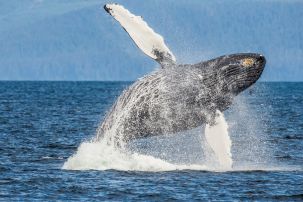Lesson summary
The class participates in a mock conference on whaling. Groups of students research a position on whaling and take their position to the negotiating table where delegates from around the world present their opinions and discuss and negotiate the future of whaling.
Learning intentions:
Students will...
- understand that whaling is an emotive and complex issue with historical and cultural precedents
- recognise that there is no one size fits all solution for whaling and that negotiations around this topic are complicated.
Lesson guides and printables
Lesson details
Curriculum mapping
Australian Curriculum content descriptions:
Year 9 English:
- Use interaction skills to present and discuss an idea and to influence and engage an audience by selecting persuasive language, varying voice tone, pitch, and pace, and using elements such as music and sound effects (ACELY1811)
- Plan, rehearse and deliver presentations, selecting and sequencing appropriate content and multimodal elements for aesthetic and playful purposes (ACELY1741)
- Interpret, analyse and evaluate how different perspectives of issue, event, situation, individuals or groups are constructed to serve specific purposes in texts (ACELY1742)
Year 10 English:
- Use organisation patterns, voice and language conventions to present a point of view on a subject, speaking clearly, coherently and with effect, using logic, imagery and rhetorical devices to engage audiences (ACELY1813)
- Plan, rehearse and deliver presentations, selecting and sequencing appropriate content and multimodal elements to influence a course of action (ACELY1751)
Year 10 Geography:
- The environmental worldviews of people and their implications for environmental management (ACHGK071)
- The application of environmental economic and social criteria in evaluating management responses to the change (ACHGK075)
Syllabus Outcomes: GE5-4, GE5-5, EN5-2A, EN5-3B.
General capabilities: Critical and creative thinking, Ethical understanding, Intercultural understanding.
Cross-curriculum priority: Sustainability OI.2, OI.4, OI.5.
Resources required
- Internet access
- Student worksheet
Additional info
This lesson has been created in partnership with WWF-Australia. Earth Hour is the world’s largest community-driven climate change campaign. At the centre of Earth Hour is switching off lights to show a commitment to taking action.
Thousands of teachers use Earth Hour’s education program to enrich their curriculum and provide pathways for young people to create change in their world.
For the most up to date Earth Hour dates, times, and events, check here.


Welcome back!
Don't have an account yet?
Log in with:
By signing up to Cool.org you consent and agree to Cool's privacy policy to
store, manage and process your personal information. To read more, please see
our privacy policy here(Opens in new tab).
Create your free Cool.org account.
Many of our resources are free, with an option to upgrade to Cool+ for premium content.
Already have an account?
Sign up with:
By signing up to Cool.org you consent and agree to Cool's privacy policy to
store, manage and process your personal information. To read more, please see
our privacy policy here(Opens in new tab).